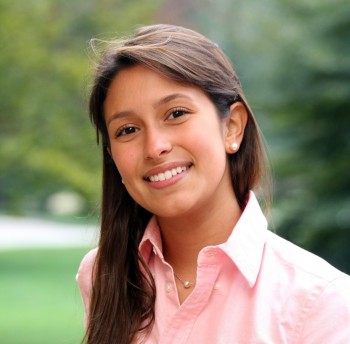Reporting the Truth in Panama

Details
When Annie Mendez '11 applied to be a summer intern at Panama's largest and most respected newspaper, La Prensa, she believed she'd be working as a research assistant. But by the end of the summer, she was a full-fledged investigative reporter, with her byline on a front-page story that made waves across the country.
Mendez, a political science major and Panamanian citizen, hadn't had much journalism experience before applying to La Prensa; she'd only written a few opinion pieces for the Bi-Co News. Yet she sought the internship because, she says, she“wanted to get to the nitty-gritty of Panamanian politics.” She achieved her goal by investigating and writing a multi-layered story about the human rights violations committed between 1968 and 1989 under the country's former dictators, Omar Torrijos and Manuel Noriega.
“I focused on how democracy has failed victims of the dictatorship,” says Mendez.“They still haven't identified the people whose bones have been exhumed by the Truth Commission, and there have been no efforts to search for disappeared victims.”
In the course of her research, Mendez interviewed the relatives of the dictators' victims and was moved by how desperately these family members wanted their voices to be heard.“For so long they've been silent,” she says.“They were very glad that something was finally being written about their plight.”
Mendez also visited excavation sites established by Panama's Truth Commission to exhume and identify the bodies of victims. However, a lack of funds makes exhumation impossible in some cases, and several sites are in danger of being lost to new construction.“It's astonishing that anyone could build on these sites and take out the bones to get rid of evidence,” says Mendez.“It's scary that no one has taken the time to protect these places.”
When Mendez's story was published, it drew responses from all across the country, especially from the Catholic Church. One of the country's most prominent victims was Rev. Hector Gallego, an activist priest who disappeared after being arrested in 1971. Bones that may be Gallego's are housed at Panama's Institute of Legal Medicine, but there have not been sufficient funds to test them for DNA. As a result of Mendez's article, Panamanian President Ricardo Martinelli announced that he would donate $45,000 towards DNA analysis of these and other unidentified bones.
This wasn't Mendez's only opportunity to get a response from President Martinelli. She accompanied La Prensa's reporters on their official interview with the president, who completed his first year of office in May. During that interview, Mendez posed some questions of her own, and received credit in print. She also conducted a personal interview with him, a lighthearted encounter that followed the style of the Vanity Fair questionnaires inspired by 19th-century writer Marcel Proust; they are series of questions posed to famous subjects about their lives, thoughts and experiences.
“He was very laid-back,” says Mendez of the president.“We had a common bond in that both of us went to the United States for high school and college.”
This year, Mendez plans to base her senior thesis on some of the topics she explored at La Prensa.“I want to address the beginning of the dictatorship, and the failures of the Truth Commission and democracy in general,” she says.“I also want to examine the potential resurgence of a civil dictatorship with the current president; many in the country see him as authoritarian.”
Mendez hopes to work for La Prensa once again next summer, after graduating in May.“I learned so much this summer about my country, and about the inner workings and minute details of politics,” she says.“It will help me get ready for graduate school.”
-Brenna McBride



